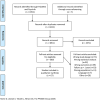Determinants of weight loss maintenance: a systematic review
- PMID: 30324651
- PMCID: PMC7416131
- DOI: 10.1111/obr.12772
Determinants of weight loss maintenance: a systematic review
Abstract
Background: Discerning the determinants of weight loss maintenance is important in the planning of future interventions and policies regarding overweight and obesity. We have therefore systematically synthesized recent literature on determinants of weight loss maintenance for individuals with overweight and obesity.
Methods: With the use of the Preferred Reporting Items for Systematic Reviews and Meta-Analyses statement, prospective studies were identified from searches in PubMed and PsycINFO from 2006 to 2016. We included articles investigating adults with overweight and obesity undergoing weight loss without surgery or medication. Included articles were scored on their methodological quality, and a best-evidence synthesis was applied to summarize the results.
Results: Our search resulted in 8,222 articles of which 67 articles were selected. In total, 124 determinants were identified of which 5 were demographic, 59 were behavioural, 51 were psychological/cognitive and 9 were social and physical environmental determinants. We found consistent evidence that demographic determinants were not predictive of weight loss maintenance. Behavioural and cognitive determinants that promote a reduction in energy intake, an increase in energy expenditure and monitoring of this balance are predictive determinants.
Conclusion: This review identifies key determinants in weight loss maintenance. However, more research regarding cognitive and environmental determinants of weight loss maintenance is needed to advance our knowledge on determinants of weight loss maintenance.
Keywords: Obesity; overweight; predictors; weight loss maintenance; weight management; weight regain.
© 2018 The Authors. Obesity Reviews published by John Wiley & Sons Ltd on behalf of World Obesity Federation.
Conflict of interest statement
We declare to have no conflict of interest.
Figures



References
-
- Astrup A, Pedersen S. Obesity In: Geissler C, Powers H. (eds). Human Nutrition. Elsevier: London, 2011, pp. 401–424.
-
- Ulen CG. Weight regain prevention. Clin Diab 2008; 26: 100.
-
- Wing RR, Phelan S. Long‐term weight loss maintenance. Am J Clin Nutr 2005; 82: 222S–225S. - PubMed

